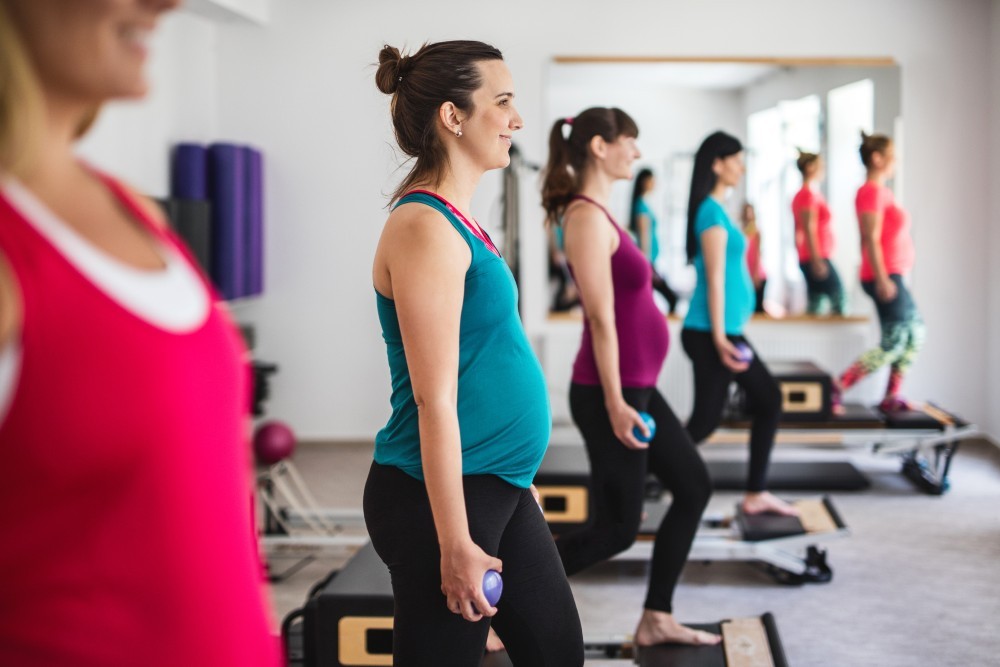
Debunking Pregnancy Exercise Myths: A Guide for Moms-to-Be
Congratulations on your pregnancy! This exciting time isn’t just about baby names and nursery colors—it’s also an opportunity to nurture your health and well-being. As you embark on this incredible journey, you must prioritize both your physical and mental health. Staying active during pregnancy can lead to many benefits, including improved mood, increased energy levels and better sleep patterns, all of which are incredibly valuable as your body undergoes significant changes.
However, when it comes to exercising while pregnant, myths abound like confetti at a gender reveal party. Many expectant mothers may feel hesitant or confused about what types of exercise are safe and suitable. It’s common to hear misconceptions such as “you shouldn’t exercise at all” or “only gentle stretching is allowed.” We’re here to clear the air and provide the facts on staying active safely and effectively during pregnancy.
Engaging in regular, moderate exercise can help reduce discomfort and prepare your body for labor and delivery. Activities such as walking, swimming and prenatal yoga can be excellent choices that promote flexibility and strength without putting too much strain on your body. Remember, it’s always a good idea to consult with your healthcare provider before starting any new exercise program to ensure it aligns with your specific needs and circumstances.
Ultimately, embracing this time to focus on your health will benefit you and create a positive environment for your growing baby. So, let’s celebrate this amazing journey together and get moving in a way that feels good for you!
The Importance of Exercising During Pregnancy
Exercise is a powerful tool for maintaining health and pregnancy is no exception. Staying active can benefit both you and your baby, reducing risks like gestational diabetes and excess weight gain. Plus, regular exercise can make labor and delivery smoother and aid postpartum recovery.
Myth Busting Time!
Myth #1: Exercise Can Harm the Baby
The fear that exercise could hurt your baby is one of the most common myths. The truth? Moderate exercise is generally safe and recommended by healthcare professionals for women with uncomplicated pregnancies.
Myth #2: You Shouldn’t Start a New Routine
Heard you can’t start exercising if you weren’t active before pregnancy? Toss that idea out! Pregnancy can be a great time to start gentle activities like walking or prenatal yoga. Always consult your healthcare provider before beginning, but don’t shy away from getting moving.
Myth #3: Avoid All High-Impact Activities
Running or dancing off-limits? Not necessarily. If you’ve been a runner or enjoyed high-impact workouts pre-pregnancy, continuing them might be perfectly fine. Listen to your body, modify as needed and stay attuned to any discomfort.
Myth #4: You Can’t Do Ab Workouts
Say goodbye to those visions of your abs disappearing forever. Core strength is essential during pregnancy. Engage in safe core exercises like pelvic tilts or plank variations to support your growing bump and ease back pain.
What Exercises Are Safe?
Consider low-impact activities such as:
- Walking: A simple, effective way to elevate your heart rate.
- Swimming: Offers buoyant support for your joints.
- Prenatal Yoga: Focuses on stretching and breathing.
- Strength Training: With lighter weights to maintain muscle tone.
Practical Tips for Staying Active
- Listen to Your Body: Your body is your best guide to staying active. Don’t push through it if you feel something’s wrong—be it fatigue, pain, or discomfort. Instead, take a moment to pause, assess how you feel and adjust your activity accordingly. This mindfulness can prevent injury and ensure your exercise routine remains enjoyable and sustainable.
- Stay Hydrated: Proper hydration is crucial for optimal performance and recovery. Make it a habit to drink plenty of water before, during and after exercise. Consider carrying a reusable water bottle with you to remind yourself to hydrate regularly. Additionally, if you’re engaging in prolonged or intense workouts, incorporating electrolytes can help replenish essential minerals lost.
- Wear Comfortable Clothing: The right attire can significantly impact your workout experience. Choose breathable, flexible clothing made from moisture-wicking materials to help keep you cool and comfortable. Ensure that your outfits accommodate your growing baby bump in a comfortable way. Investing in good-quality footwear is also essential, as proper shoes provide the support and stability needed for various activities, reducing the risk of injury.
Ready to Get Started?
Joining a community like The Wellbridge Family of Clubs (Colorado Athletic Club, New Mexico Sports & Wellness and Maryland Athletic Club) can be a wonderful way to stay motivated and informed. With amenities ranging from pools to expert-led classes, you’re supported every step of the way.